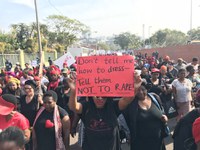
Not yet Uhuru as women take to tech to fight off abuse

One of the recent global protests is #MeToo, a movement founded a decade ago by Tarana Burk, a US advocate against sexual violence.
She was moved by an encounter with a girl at a youth camp who reported that her mother's boyfriend was abusing her.
A decade later, reporting of the hidden scourge of sexual violence exploded after Harvey Weinstein was exposed by the New York Times as a subject of multiple accusations of sexual harassment.
One of the actresses, Alyssa Milano, stumbled across #MeToo movement and encouraged women to retweet, achieving more than 500000 retweets in one night.
#MeToo protest is not the first of its kind. Not so long ago, in India in 2012, widespread protests erupted from ordinary women as a reaction to gang rape of a 23-year-old Jyoti Singh who was assaulted so brutally that her internal organs were injured. At the same time in Morocco, a 16-year-old Amina Filali committed suicide after having been forced to marry a man who raped her at gunpoint. A few years later, in 2016, women in Peru took to the streets under the banner of #NiUnaMenos (not one less).
